Related Research Articles

Parliament-Funkadelic is an American music collective of rotating musicians headed by George Clinton, primarily consisting of the funk bands Parliament and Funkadelic, both active since the 1960s. Their eclectic style drew on psychedelia, outlandish fashion, and surreal humor. They released albums such as Maggot Brain (1971), Mothership Connection (1975), and One Nation Under a Groove (1978) to critical praise, and scored charting hits with singles such as "Tear the Roof Off the Sucker" (1975) and "Flash Light" (1978). Overall, the collective achieved thirteen top ten hits in the American R&B music charts between 1967 and 1983, including six number one hits. Their work would have an influential effect on subsequent funk, post-punk, hip-hop, and techno artists of the 1980s and 1990s, while their collective mythology would help pioneer Afrofuturism.

The Parliaments were an American vocal quintet from Plainfield, New Jersey, United States. Originally formed in the back room of a barbershop in 1956, the quintet was named after the cigarette brand. The Parliaments initially performed doo-wop music; after some early personnel changes their lineup solidified with George Clinton, Ray Davis, Fuzzy Haskins, Calvin Simon, and Grady Thomas. Clinton was group leader and manager, and part owner of the barbershop where the group convened to entertain customers. The group later changed its style, evolving into the bands Parliament and Funkadelic, which found success in the 1970s.
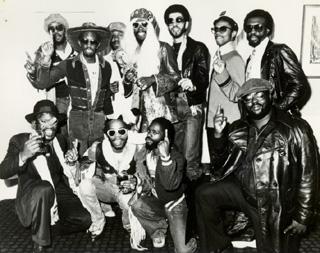
Parliament was an American funk band formed in the late 1960s by George Clinton as a flagship act of his P-Funk collective. Evolving out of an earlier vocal group, Parliament became associated with a more commercial and less rock-oriented sound than its sister act Funkadelic. Their work incorporated Afrofuturism concepts, horn arrangements, synthesizer, and outlandish theatrics. The band scored a number of Top 10 hits, including the million-selling 1976 single "Give Up the Funk ," and Top 40 albums such as Mothership Connection (1975).
The P-Funk mythology is a group of recurring characters, themes, and ideas primarily contained in the output of George Clinton's bands Parliament and Funkadelic. This "funkology" was outlined in album liner notes and song lyrics, in addition to album artwork, costumes, advertisements, and stage banter. P-Funk's "Dr. Seussian afrofunk" is often cited as a critical component of the Afrofuturism movement.
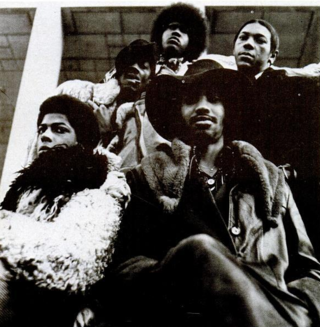
Funkadelic was an American funk rock band formed in Plainfield, New Jersey in 1968 and active until 1982. As one of the two flagship groups of George Clinton's P-Funk collective, they helped pioneer the funk music culture of the 1970s. Funkadelic initially formed as a backing band for Clinton's vocal group the Parliaments, but eventually pursued a heavier, psychedelic rock-oriented sound in their own recordings. They released acclaimed albums such as Maggot Brain (1971) and One Nation Under a Groove (1978).

Edward Earl Hazel was an American guitarist and singer in early funk music who played lead guitar with Parliament-Funkadelic. Hazel was a posthumous inductee to the Rock and Roll Hall of Fame, inducted in 1997 with fifteen other members of Parliament-Funkadelic. His ten-minute guitar solo in the Funkadelic song "Maggot Brain" is hailed as "one of the greatest solos of all time on any instrument". In 2023, Rolling Stone ranked Hazel at no. 29 in its list of 250 of the greatest guitarists of all time.

Maggot Brain is the third studio album by the American funk rock band Funkadelic, released by Westbound Records in July 1971. It was produced by bandleader George Clinton and recorded at United Sound Systems in Detroit during late 1970 and early 1971. The album was the final LP recorded by the original Funkadelic lineup; after its release, founding members Tawl Ross (guitar), Billy Nelson (bass), and Tiki Fulwood (drums) left the band for various reasons.

George Bernard Worrell, Jr. was an American keyboardist and record producer best known as a founding member of the Parliament-Funkadelic collective. In later years, he also worked with acts such as Talking Heads, Bill Laswell, and Jack Bruce. He is a member of the Rock and Roll Hall of Fame, inducted in 1997 with fifteen other members of Parliament-Funkadelic. Worrell was described by journalist Jon Pareles as "the kind of sideman who is as influential as some bandleaders," with his use of synthesizers particularly impactful on funk and hip hop.
Clarence Eugene "Fuzzy" Haskins was an American singer. He performed with 1950s and 1960s doo-wop group, The Parliaments, and was a founding member of the groundbreaking and influential 1970s funk bands Parliament and Funkadelic, also known as Parliament-Funkadelic. He left Parliament-Funkadelic in 1977 to pursue a solo career. He is a member of the Rock and Roll Hall of Fame, inducted in 1997 with fifteen other members of Parliament-Funkadelic. In 2019, he and Parliament-Funkadelic were given Grammy Lifetime Achievement Awards.
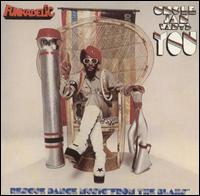
Uncle Jam Wants You is a concept album by American funk rock band Funkadelic. It was released by Warner Bros. Records in 1979, and was later reissued on CD by Priority Records. It was produced by George Clinton under the alias Dr. Funkenstein. It is the first Funkadelic album since America Eats Its Young in 1972 not to sport a cover illustrated by Funkadelic artist Pedro Bell, though Bell did provide artwork for the album’s back cover and interior. Uncle Jam Wants You was the second Funkadelic album to be certified gold. The album peaked at No. 18 on the Billboard 200 and No. 2 on the Billboard Top R&B/Hip-Hop Albums chart.

Garry Marshall Shider was an American musician and guitarist. He was musical director of the P-Funk All-Stars for much of their history. He was inducted into the Rock and Roll Hall of Fame in 1997, with fifteen other members of Parliament-Funkadelic.
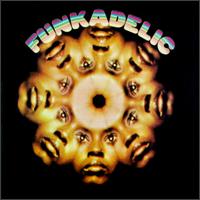
Funkadelic is the debut album by the American funk rock band Funkadelic, released in 1970 on Westbound Records.
Ramon "Tiki" Fulwood was an American musician. He was the drummer for the funk bands Parliament and Funkadelic, as well as a member of the Rock and Roll Hall of Fame, inducted in 1997 with fifteen other members of Parliament-Funkadelic.
Lucius "Tawl" Ross was an American musician. He was the rhythm guitarist for Funkadelic from 1968 to 1971, and played on their first three albums. He left the band in 1971 soon after a debilitating experience with LSD, which is reported to have resulted in brain damage. He moved back home to North Carolina and dropped out of the music scene, but resurfaced in 1995 after a nearly 25-year absence to release a solo album, a.k.a. Detrimental Vasoline - Giant Shirley, issued by Coconut Grove Records under the name Tal Ross.
Cordell "Boogie" Mosson was an American bassist who was a member of Parliament-Funkadelic. He was given a Lifetime Achievement Award Grammy in 2019.
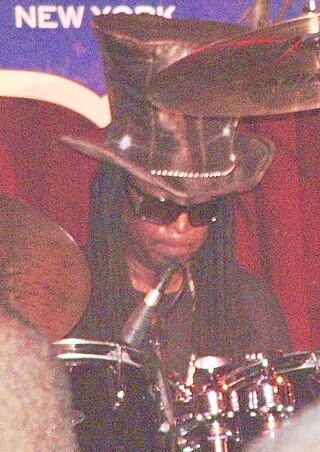
Jerome Eugene "Bigfoot" Brailey is an American drummer, best known for his work with P-Funk, which included the bands Parliament, Funkadelic, and numerous related projects. Brailey is a member of the Rock and Roll Hall of Fame, inducted in 1997 with fifteen other members of Parliament-Funkadelic.

Osmium is the debut album of American funk band Parliament, led by George Clinton. The album has a psychedelic soul sound with a spirit of experimentation that is more similar to early Funkadelic than the later R&B-inspired Parliament albums. It was originally released in July 1970 on Invictus Records. The original vinyl release contained a glossy lyric sheet.
"The Goose" is a song by the funk band Parliament. It was released as a two-part single, the group's first on their new label Casablanca Records. It was also a track on their 1974 album Up for the Down Stroke. The song failed to chart.
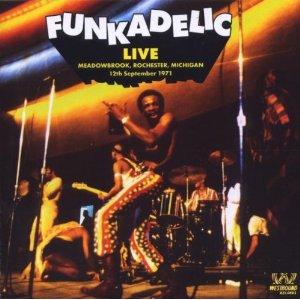
Funkadelic Live: Meadowbrook, Rochester, Michigan 12th September 1971 is a 1996 live release featuring the only official in-concert recording from early in the career of Funkadelic. Westbound Records owner Armen Boladian had decided to record the show without the band's prior notice, for a possible official live album release. Boladian then decided not to go forward with the project. The soundboard recording resided with engineer Ed Wolfram until being unearthed in 1996. The album contains the entire live performance of September 12, 1971, minus approximately three minutes of between-song chatter.
Ruth Copeland is an English-born former singer, based in the United States since the 1960s and known for her collaborations with George Clinton and Parliament-Funkadelic.
References
- 1 2 3 4 5 6 7 "Billy "Bass" Nelson | Biography & History". AllMusic. Retrieved 2020-04-02.
- ↑ Bowman, Rob (1992). Liner notes to Music For Your Mother.
- ↑ Colin Larkin, ed. (1997). The Virgin Encyclopedia of Popular Music (Concise ed.). Virgin Books. pp. 497/8. ISBN 1-85227-745-9.
- 1 2 Bowman, Rob (1996). Liner notes to Live: Meadowbrook, Rochester, Michigan – 12th September 1971.
- ↑ "Funkadelic | Biography & History". AllMusic. Retrieved 2020-04-02.
- ↑ Makin, Bob. "Parliament-Funkadelic: From doo-wop to hip-hop". MY CENTRAL JERSEY. Retrieved 2020-04-02.
- ↑ "420 Funk Mob". Nashville Scene. 31 December 2009. Retrieved 2020-04-02.
- ↑ "SONS OF F.U.N.K." TheRoanoker.com. 2019-09-17. Retrieved 2020-04-02.